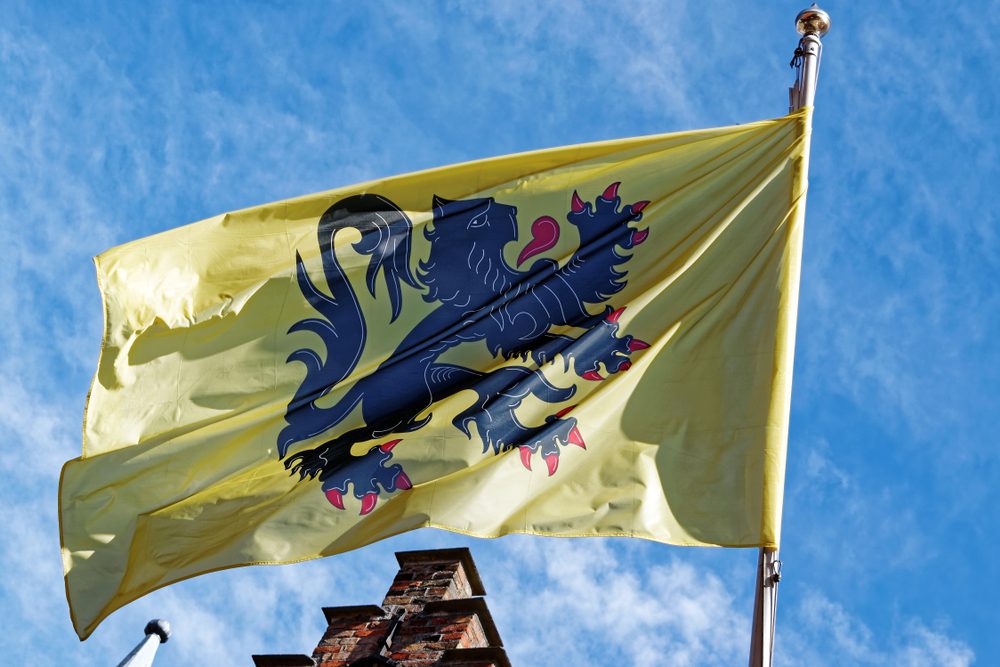
The Flemish nationalist party Vlaams Belang has yet again sounded the clarion call for independence. In a Sunday speech, party chairman Tom Van Grieken proposed that a majority vote won in the 2024 elections by his party and New Flemish Alliance (N-VA) should be instrumentalized to achieve this goal, VRT NWS reports.
A rough outline for this plan was laid out in Bruges, at Vlaams Belang’s annual celebration of July 11th. On that day in 1302, the Flemish achieved victory over the French at the Battle of the Golden Spurs. In front of a crowd of about 1,000, Van Grieken took the occasion to advocate for a peaceful and orderly breakup of the country. Because of its intricate governmental structure, Belgium is infamous for its many political crises, which often make state reforms a plodding affair.
Instead of trying to “save Belgium”—a monarch-headed federation which has to juggle the interests of Dutch-speaking Flemish, French-speaking Walloons, as well as those of a German-speaking community—it should be “dismantled” instead, Van Grieken said.

Pooh-poohing the notion of a confederalist model—as proposed by his N-VA counterpart, Bart de Wever—Van Grieken said that “confederalism is a lie,” and “the least realistic option of all” in absence of the two-thirds majority it requires. “Belgium is the problem and Flanders is the solution,” he proclaimed. Van Grieken then proceeded to make the analogy that “if someone wants to get divorced, you don’t need the other’s permission. One or the other initiates, and then the orderly division of goods and negotiations start.”
In his speech, Van Grieken expressed deep disappointment with the N-VA, and its vehemence against joining forces. In late June, N-VA chairman Bart De Wever reiterated during an interview with Radio 1 that he does not envision any collaboration with Vlaams Belang, saying that its political programme and its personnel hold no merit, and that he hoped citizens would “vote wisely” in the 2024 elections.
Soon after, Flemish Prime Minister Jan Jambon (N-VA) said that a majority formed by Vlaams Belang and N-VA is interesting, but only for exerting pressure on the federal level.
This is a method Van Grieken rejects. With his party and N-VA (which constitute the most popular Flemish parties) conjoined, we “can finally give the Flemish what they want: a right-wing and pro-Flemish policy by the parties that win the elections and polls. That is not possible with the PS (Parti Socialiste): that party aims for just the opposite,” he said.
Once the two parties point in the same direction and the 2024 election is secured, they could start building towards Flemish independence, Van Grieken went on, stating that as long as Belgium as an entity remains, “everything is stuck” on such issues as tax reforms, pension plans, and migration policy. “But in Flanders, we can regain control of our own borders, make work worthwhile, and keep Flemish prosperity within Flemish borders,” he argued.
In the N-VA’s camp, the confederalist option still remains the only viable one. Asked for a reaction to Van Grieken’s statements, de Wever said on Monday that he is doubtful that the 2024 election outcome will allow for a new government to be formed. It is for this reason that he considers confederalism to be “the only answer.”
Parrying Van Grieken’s claim that confederalism is a lie, de Wever said the greatest political lie was the “radical Right” in Flanders. “They have been promising all sorts of things for a hundred years, but nothing constructive has ever been delivered. Look at the individuals grouping around that party. Everything Van Grieken says indicates that this will not change. It is wasted energy.”
In 1989, a so-called ‘cordon sanitaire’ was created to shut out Vlaams Belang over some ‘extreme’ statements that it had made. All Flemish political parties then agreed to refuse any cooperation with the party. While this ‘cordon sanitaire’ is still in force, increasingly voters, as well as politicians, journalists, and professors, are criticizing it for being “undemocratic.”
After Vlaams Belang received 20% of the Flemish vote during the 2019 elections, N-VA started a dialogue, and has been the only one thus far to engage with the snubbed party in any meaningful fashion.
On this issue, their relationship looks to remain a strained one.
